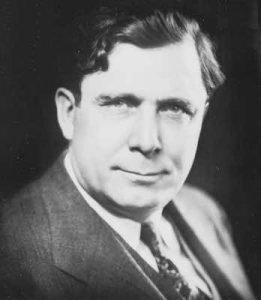
Some say that it’s not Donald Trump’s bluster and bravado that will keep him from the Republican nomination for President–it’s that he never has held elective office before.
However, if the GOP nominates a businessman who is a political rookie for President, it won’t be the first time. In 1940, the GOP thought a businessman who never held elective office, Wendell Willkie, was the best choice for President and gave him the nomination.
Like Trump, Willkie criticized policies of the existing Democratic administration that he thought were anti-business. That’s because, like Trump, he came from a corporate background. Willkie was a lawyer first for the Firestone Tire and Rubber Company in Ohio, and then he moved on to New York to make his fortune, as Trump would decades later. In Willkie’s case, the Commonwealth and Southern Corporation of New York, a power company, made him wealthy.
Also like Trump, Willkie flirted with Democratic politics before becoming a Republican. Willkie was active in Democratic politics and contributed money to Franklin D. Roosevelt’s first Presidential campaign in 1932, just as Trump contributed money to Democratic campaigns before becoming a Republican.
Willkie went from businessman to Presidential contender the same way Trump did–by becoming a media star. Willkie became a national figure by appearing on the popular ‘Town Hall’ radio program, which was broadcast across the U.S.A. Like Trump, he was a multimedia expert, and he obtained the backing of the publishers of some of the top print publications in the country–the New York Herald Tribune, the Scripps-Howard newspapers, and Look magazine.
Trump has his following of true believers, and so did Willkie. Willkie’s supporters created a nationwide grassroots network, and that’s happening with Trump now.
Like Trump, Willkie was polling in the high twenties in terms of percentage, and in a wide field and backed by average Joes instead of party bosses, he ended up with the nomination.
And how did the novice candidate do when he ran against Roosevelt for President in 1940? Better than any of the professional politicians who ran against Roosevelt in other Presidential elections. Willkie got over 22.3 million votes. In 1932, Herbert Hoover tallied only 15.7 million against FDR. In 1936, Alf Landon got 16.6 million against Roosevelt. And in 1944, Thomas Dewey tallied 22.1 million running against FDR.
Republicans have not been hesitant to run businessmen for the U.S. Senate and for Governorships. In Illinois, the Republican Governor, Bruce Rauner, is a businessman who never held political office before. People think the GOP won’t nominate a businessman without a political background for the Presidency, but they’ve already done it with Willkie.
So don’t think Donald Trump can’t ride his business and media credentials to the Republican Presidential nomination. Willkie did it 75 years ago, so it’s nothing new.
Learn more about the political strategies of successful candidates in Winning Political Campaigns: A Comprehensive Guide to Electoral Success, a how-to e-book providing information on everything a candidate, campaign worker, or activist needs to know to conduct a political race.
Leave a Reply